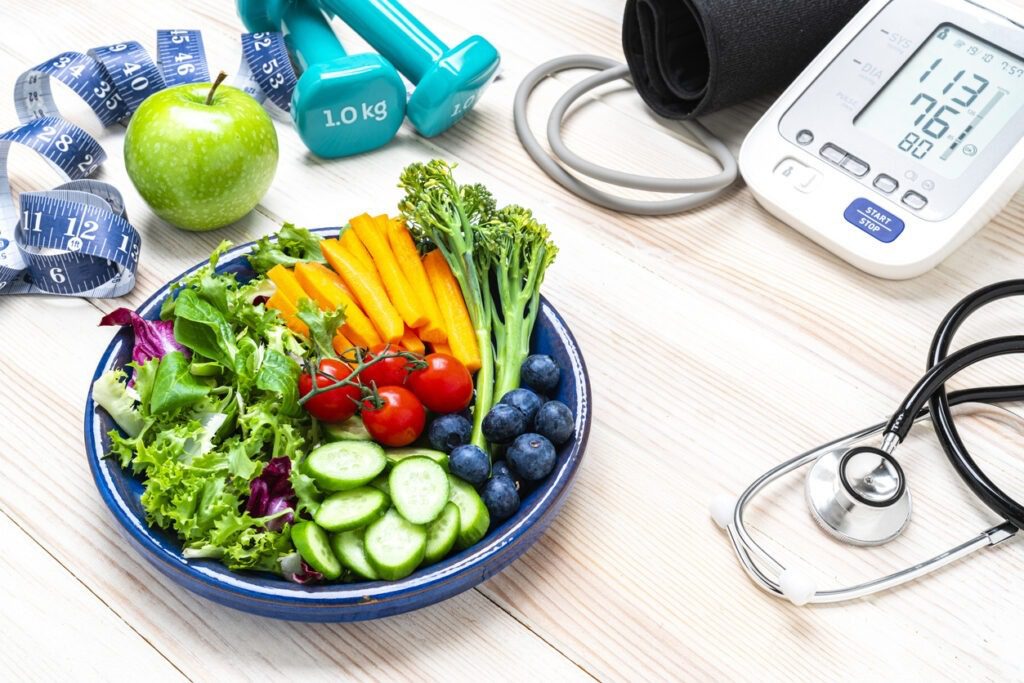Let’s discover the secrets to managing how to control blood pressure through diet, and the tantalizing wonders of your kitchen. Say goodbye to bland diets and hello to a vibrant, flavorful life!
A body’s overall functioning depends upon the fluid pressure, and blood pressure is the name force applied by the blood against the walls of the arteries as the heart pumps it around the body. It is measured in millimeters of mercury (mmHg) and described as two numbers: systolic pressure over diastolic pressure.
The unit mmHg is used to measure the pressure in the arteries during two phases of the heartbeat. Here, the diastolic pressure is the lower number and identifies the force when the heart is at rest between beats. The systolic pressure is the higher number and represents the force when the heart compacts, pumping blood into the arteries.
High blood pressure, or hypertension, happens when the force of blood against the artery walls is frequently too high. It is often referred to as the “silent killer” because it generally does not cause noticeable symptoms until it reaches its peak. With time, untreated high blood pressure can lead to serious health issues, including heart stroke, heart disease, and kidney problems.
Low blood pressure, or hypotension, is considered by abnormally low pressure in the arteries. It is usually less concerning than high blood pressure, shallow blood pressure can lead to insufficient blood flow to the organs, causing dizziness, fainting, and other symptoms.
The causes of low blood pressure include heart problems, dehydration, severe infections, poor diet, and endocrine disorders. Some individuals naturally have lower blood pressure without experiencing unfavorable effects.
Treatment for low blood pressure depends on the fundamental cause, and lifestyle adjustments such as increasing salt intake, staying hydrated, and avoiding sudden movements can help manage lenient cases. Severe hypotension requires medical evaluation to identify and address the underlying issue.
How To Control Blood Pressure Through Diet?

Lifestyle factors such as diet, physical activity, and stress management, as well as genetic predisposition, can contribute to the occurrence of low blood pressure or high blood pressure. Regular monitoring and management are indispensable if you want to prevent complications and bring your blood pressure under control. Managing blood pressure through natural means at home involves adopting a heart-healthy lifestyle. Lifestyle factors are categorized by dietary or non-dietary elements, which play a crucial role in maintaining healthy blood pressure levels. To justify, how to control blood pressure through diet, Here are 10 dietary tips to help control blood pressure:
1. Balanced Diet Intake
Eating a balanced diet is crucial for maintaining blood pressure as it provides essential nutrients that support overall cardiovascular health. A diet rich in fruits, vegetables, whole grains, lean proteins, and healthy fats contributes to optimal blood vessel function and helps regulate blood pressure. Consistent adherence to a balanced diet reduces the risk of hypertension and promotes long-term heart well-being.
2. Reduce Sodium Intake
Reducing sodium intake is crucial for maintaining blood pressure as excessive sodium can lead to fluid retention, causing increased blood volume and higher pressure on arterial walls. A lower sodium intake supports a healthier cardiovascular system, reducing the risk of hypertension and related complications. Prioritizing whole, unprocessed foods and mindful salt consumption contribute to overall heart health.
3. Limit Saturated and Trans Fats
Limiting saturated and trans fats is crucial for maintaining blood pressure as these fats can contribute to arterial stiffness and hypertension. A diet low in saturated and trans fats supports heart health by reducing the risk of atherosclerosis promoting optimal blood vessel function and choosing healthier fat sources, such as those found in olive oil and nuts, aids in blood pressure management.
4. Increase Potassium-Rich Foods
Increasing potassium-rich foods is essential for maintaining blood pressure as potassium helps balance sodium levels, promoting healthy fluid balance and relaxing blood vessel walls. Adequate potassium intake supports the body’s natural mechanisms for blood pressure regulation, reducing the risk of hypertension and cardiovascular issues. Incorporating bananas, oranges, potatoes, and leafy greens into the diet contributes to a heart-healthy potassium balance.
5. Use Omega-3 Fatty Acids
Expand usage of omega-3 fatty acids is crucial for maintaining blood pressure as these fats have anti-inflammatory effects and support vascular health. Consuming fatty fish like salmon, flaxseeds, chia seeds, and walnuts, rich in omega-3s, helps lower blood pressure and reduce the risk of cardiovascular issues. Including these foods in the diet promotes a heart-healthy balance of fats and contributes to overall blood pressure regulation.
6. Choose Lean Proteins
Choosing lean proteins is vital for maintaining blood pressure as they are lower in saturated fats, supporting heart health. Lean protein sources, such as fish, poultry, beans, and legumes, contribute to a balanced diet, reducing the risk of hypertension and cardiovascular complications. Prioritizing these proteins helps manage weight and promotes overall cardiovascular well-being.
7. Limit Caffeine Intake
Limiting caffeine intake is crucial for maintaining blood pressure as excessive consumption can temporarily raise blood pressure levels. Moderation in coffee and other caffeinated beverages supports cardiovascular health and helps prevent potential spikes in blood pressure. Individuals sensitive to caffeine should be mindful of their intake to promote overall blood pressure management.
8. Moderate Alcohol Consumption
Moderating alcohol consumption is important for maintaining blood pressure, as excessive drinking can lead to hypertension and cardiovascular issues. Limited alcohol intake, defined as up to one drink per day for women and up to two drinks per day for men, supports heart health and reduces the risk of elevated blood pressure. Responsible alcohol consumption aligns with a heart-healthy lifestyle and helps maintain optimal blood pressure levels.
9. Monitor Portion Sizes
Monitoring portion sizes is crucial for blood pressure maintenance as overeating can contribute to weight gain and hypertension. Controlling portion sizes helps regulate caloric intake, supporting a healthy weight and reducing the risk of elevated blood pressure. Being mindful of portion sizes promotes a balanced diet and overall cardiovascular well-being.
10. Maintain a Healthy Weight
Maintaining a healthy weight is essential for blood pressure control, as excess weight increases the workload on the heart and raises blood pressure. Achieving and sustaining a healthy weight through a balanced diet and regular exercise reduces the risk of hypertension and its associated complications. Weight management is a key component of overall cardiovascular health and optimal blood pressure regulation.
7 Amazing Tips to Control Blood Pressure Naturally
Certainly, managing blood pressure naturally involves more than just dietary changes. To know, how to control blood pressure naturally at home, follow these seven non-dietary ways to control blood pressure at home instantly, included as:
1. Stay Hydrated
Taking enough amount of water can help maintain blood pressure as proper fluid balance supports healthy blood volume and circulation. Dehydration can lead to a temporary rise in blood pressure, emphasizing the importance of adequate water intake and ensuring hydration aids in optimal kidney function, which plays a role in blood pressure regulation. Making water a primary beverage choice contributes to overall cardiovascular well-being and helps prevent potential spikes in blood pressure.
2. Adequate Sleep
Getting sufficient sleep is important for maintaining blood pressure, as sleep deprivation can lead to increased stress hormones and elevated blood pressure levels. Regular, quality sleep supports overall cardiovascular health and helps regulate the body’s stress response.
Aiming for 7-9 hours of sleep per night can help optimal blood pressure control and reduce the risk of hypertension-related complications. A prime concern of good sleep contributes to a comprehensive strategy for maintaining healthy blood pressure levels and ceasing the risk of sleep disorders such as sleep deprivation etc.
3. Manage Stress
Effectively managing stress is crucial for maintaining blood pressure, as chronic stress can increase the risk of hypertension. Stress management techniques such as deep breathing, meditation, and mindfulness help promote relaxation and decrease the physiological responses that can elevate blood pressure. Establishing a regular stress reduction routine supports overall cardiovascular health and supports other lifestyle measures for optimal blood pressure control. Giving priority to mental well-being is integral to a holistic approach to blood pressure maintenance.
4. Regular Exercise
Regular exercise is essential for maintaining blood pressure by improving heart health, promoting blood vessel flexibility, and aiding in weight management. Performing physical activity for at least 150 minutes per week contributes to optimal cardiovascular function, decreasing the risk of hypertension. Moreover, Exercise also helps lower stress levels, further supporting overall blood pressure control.
5. Mindful Meditation
Mindful meditation is essential for blood pressure maintenance as it boosts relaxation and reduces the physiological responses to stress, a significant contributor to hypertension. Engaging in regular mindfulness practices, such as deep breathing and focused attention, helps regulate the nervous system and lower blood pressure. The soothing effects of mindful meditation contribute to overall cardiovascular health, supporting optimal blood pressure levels. Combining these practices into a daily routine fosters a holistic approach to stress management, enhancing the body’s ability to maintain healthy blood pressure. Consistent mindfulness aligns with a heart-healthy lifestyle and complements other strategies for blood pressure control.
6. Quit Smoking and Drugs
Quitting smoking and avoiding drug consumption plays a pivotal role in maintaining healthy blood pressure. Smoking and certain drugs can constrict blood vessels, elevate heart rate, and contribute to hypertension. By leaving these habits, individuals reduce the risk of cardiovascular complications and support overall blood pressure control. Seeking professional guidance and support enhances the success of efforts to quit smoking and curb drug use for long-term cardiovascular health.
7. Monitor Blood Pressure
Regularly monitoring blood pressure is indispensable for maintaining cardiovascular health as it allows for early detection of potential issues. Routine blood pressure checks enable timely intervention and help track the effectiveness of lifestyle changes or medications. Consistent monitoring empowers individuals to make enlightened decisions about their health, promoting proactive management of blood pressure. Whether at home or during regular medical check-ups, keeping track of blood pressure levels is a fundamental aspect of a comprehensive approach to overall cardiovascular health maintenance.
In conclusion, how to control blood pressure naturally at home remains a question for an individual who suffers from such a disorder. By embracing a healthy lifestyle, blood pressure levels can be controlled through these natural and effective approaches. The interconnected elements of regular physical activity, a balanced diet rich in fruits and vegetables, maintaining a healthy weight, and managing stress can collectively contribute to optimal cardiovascular health
By making precautionary choices in our daily lives, we empower ourselves to take control of our blood pressure and reduce the risk of hypertension-related complications. Adopting these lifestyle changes not only promotes overall well-being but also serves as a continuous and empowering for maintain healthy blood pressure levels in the long run. As we celebrate the one-year milestone of prioritizing our health through these natural intercessions, let us continue to cultivate habits that support a heart-healthy lifestyle for years to come.






